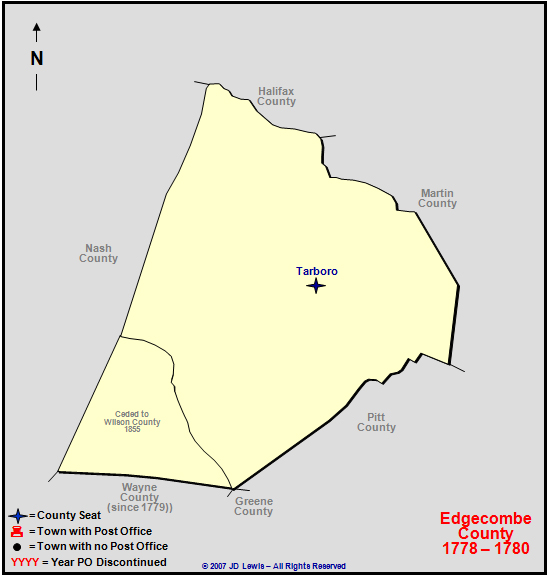My fifth great grandfather, Exum (or Axum) Drake was born about 1750 in Southampton County, Virginia. For unknown reasons, Exum moved to Edgecombe County, North Carolina sometime in the latter half of the 1770's. As I shared in a previous post, in 1779, Exum purchased 100 acres of land in Edgecombe County on Town Creek adjacent to David Scarborough. So I decided to do some research, learn about the area, and try to find out where (approximately) his land was located.
 |
| Edgecombe County, NC from wikipedia.org |
Edgecombe County, North Carolina is one of the oldest counties in the state. It was settled by Europeans early in the eighteenth century, after the defeat of the Tuscarora Indians who inhabited the area. The colonial assembly created the county in 1741 from Bertie County.
From www.carolana.com/NC/Counties/edgecombe_county_nc.html
On the same website, there is an Agricultural Report by Jeremiah Battle from 1811. Parts were published in the Tarboro Press in 1842:
"The County of Edgecombe extends about forty miles from North to South, and thirty from East to West. It is generally a level county, with gentle elevations; and no destitute of pleasant and healthy situations. The soil is exceedingly diversified, consisting of a gradation from poor piney woods, to a rich swamp land, lying on the creeks and river. The proportion of these is about three-fourths of the former to one-fourth of the latter. The best river land produces abundantly of Indian corn, peas, wheat, rye, oats, sweet potatoes, Irish potatoes, cotton, flax, and it is believed some spots are well adapted to the culture of hemp. The best piney land produces everything that the river land does, but not in the same degree of perfection; and the most barren piney lands are yet valuable, where they are not too remote from navigation, for the tar and turpentine they afford. The lands on the river are valued from $10 to $20 per acre; on the creeks, from $5 to $10; and the piney woods from $1 to $5."
"The county was first settled... probably prior to the year 1726. As the first settlement of the continent commenced at the mouths of rivers, so these interior settlements commenced at the mouth of creeks progressing upwards, as the natives gave ground. At the mouth of Town Creek [emphasis added] it is believed, was the first settlement in the county. The site of Tarborough, and its vicinity, were settled at an early period"
"Tar River or Pamtico, is the only river in the county. Both these are probably Indian names. It appears that Roanoke was considered, even by the natives, who lived in the woods, as a sickly place. Those who changed their residence from that river to this, called this Tar river, signifying, it is said, the river of health. It rises in Granville county, and runs through Franklin, Nash, Edgecombe, Pitt and Beaufort counties, and empties into Pamtico sound. That portion of Tar river which passes through Edgecombe, meanders through a tract of 75 miles, from Nash to Pitt. It is from 50 to 125 yards wide. Tar River has two bridges in the county. The most considerable one is at Tarboro. It is about 200 yards long, well built, and wide enough for two carriages to pass abreast. Eight miles above is Teat's bridge, which is also built and supported at the public expense. The tributary streams of Tar River are on the north side, Deep Creek, Fishing Creek, and Swift Creek; on the south side, Town Creek [emphasis added], Hendrick's Creek and others of less note."
"Town Creek is not navigable, but is larger than Deep Creek. It joins Tar River 10 miles below Tarboro."

"Edgecombe County decreased in size in 1746 when Granville County was created, in 1758 when Halifax County was created, again in 1777 when Nash County was created, and again in 1855 when Wilson County was created. Its population grew from 10,255 in 1790 to 55,606 in 2000."
From http://www.carolana.com/NC/Counties/edgecombe_county_nc_evolution_with_towns.html
So I now know a general area. Will I ever know the exact location of Exum's land? Probably not. However, one day, I plan to take a little road trip over to Edgecombe County and see exactly what they have in their courthouse.
No comments:
Post a Comment